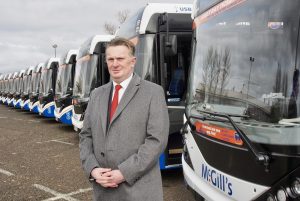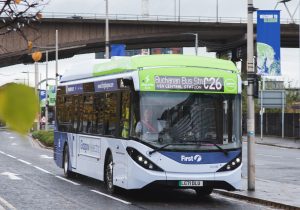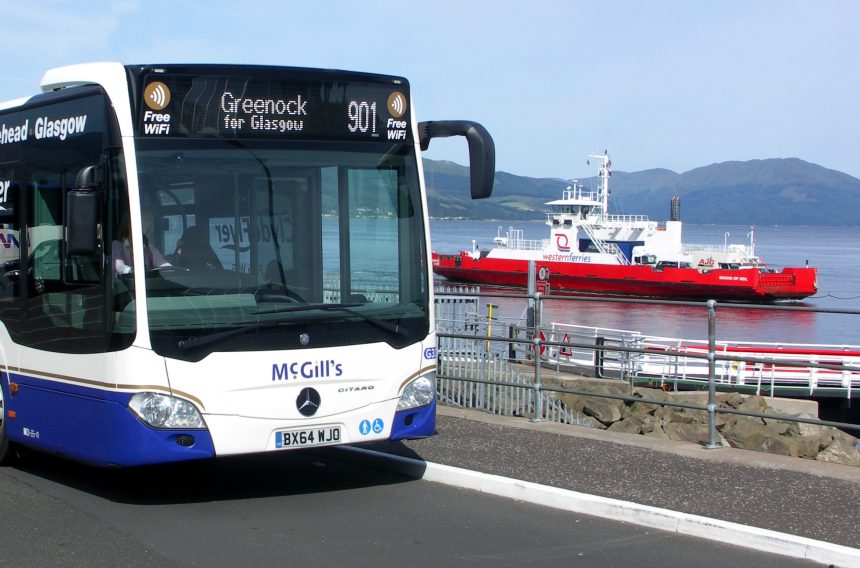Franchising of bus services in the Glasgow city region is the “most effective way” to improve them, a report from the Centre for Cities (CfC) in partnership with pressure group Get Glasgow Moving (GGM) has claimed. It immediately drew an incandescent response from McGill’s Bus Group co-owner Sandy Easdale.
CfC and GGM claim that a franchised approach in Glasgow is preferable to either creation of a Bus Service Improvement Partnership (BSIP) or establishment of a municipally-owned operation. All three avenues are outlined in the Transport (Scotland) Act 2019 as part of bus reform efforts.
The two parties want that legislation to facilitate improved coverage by Glasgow’s public transport network and reverse bus deregulation in the city region, which the report claims “is widely seen as a failure.” Franchising would lead to “baked in” collaboration,” it continues.
Glasgow bus franchising ‘from the Vladimir Putin playbook’
Mr Easdale responded to the report’s publication in remarkable fashion. He describes the reregulation of bus services described within it as “businesses confiscation, straight out of the Vladimir Putin playbook.”
The McGill’s co-owner reacted in a similar manner to an offer made a day earlier by Mayor of Greater Manchester Andy Burnham to work with the Scottish Government to help introduce bus franchising in the country. Mr Easdale said then via the Scottish Daily Express that he would fight any such moves “tooth and nail in the courts.”
Mr Burnham previously pledged to assist city regions in the North of England in delivering of franchising, noting that the Greater Manchester Combined Authority would be “more than happy” to engage in such support.

Mr Easdale also claims that Strathclyde Partnership for Transport (SPT) is already preparing a plan to franchise bus services in Glasgow.
During 2021, SPT published a paper on overhaul of the region’s public transport that advocated centrally-managed services, although it noted that the approach was not yet final.
Addressing the CfC and GGM position, Mr Easdale calls those parties “wacky activists” and notes that despite being under SPT’s control, the Glasgow Subway does not run after 1800hrs on Sundays. Oversight of the city region’s transport network should be left “to those who understand the financial mechanics of the… industry,” he adds.
‘Significant’ cost of Glasgow bus franchising is acknowledged
Delivery of bus franchising in Glasgow would require a significant financial commitment, the report acknowledges. It says that in the first phase of wider overhaul, the Scottish Government must support SPT with “funding and powers to lead a franchised bus system,” and money for capital investment.
A 10-year settlement would be required to see through franchising. Based on costs in Greater Manchester, the report authors estimate that an initial five-year period would need £100 million, with more following.
Speaking about the policy position, Centre for Cities Chief Executive Andrew Carter says that Glasgow’s current economic underperformance is the equivalent of 4.6% of Scotland’s GDP. Poor public transport provision is one of the keys to that lag, he notes.

“The Transport Act provides an important opportunity to improve public transport in and around Glasgow,” Mr Carter continues.
“Franchising buses under this route would better integrate different parts of Glasgow’s public transport system.
“To get this to happen will require large upfront investment from local and national government. But this is a price worth paying.”
Reregulation unaffordable, says McGill’s co-owner
Mr Easdale says that Scotland’s parlous fiscal state leaves franchising unaffordable. In response to Mr Burnham, he describes the process in Greater Manchester as “a huge tombola… at a huge cost to the taxpayer.”
Taking aim at the deregulated model, the report claims that it has given bus operators scope to “set higher [fares] and provide a lower-quality service,” removed the ability to cross-subsidise routes, and negated any incentives for local transport authorities (LTAs) to introduce long-term pro-bus policies.

Franchising is highlighted by the report as being more effective than BSIP provision. It adds that changes which could be achieved via partnership “are much more limited in scope.”
That is because an LTA is unable to set routes and fares, it continues, adding that integration with other modes is also more difficult.
BSIPs are also exposed to objections from bus operators, the report continues. If a sufficient number did so, a partnership “could not go ahead.” A further issue highlighted is that BSIPs do not allow LTAs to benefit “directly” from bus infrastructure as those bodies do not receive fare income.
However, in a proposed Enhanced Partnership Plus in West Yorkshire, operators have pledged to agree a defined process for reinvestment of benefits realised from public capital spend. Mr Easdale, meanwhile, is adamant that he will not “stand by and have my business stolen from me.” SPT has not commented on the report.
Download the Centre for Cities report here.



























